ST. HELENA — If you live in St. Helena, there’s a good chance Gordie Adams knows your address, what you’ve been buying online, and a little bit about what’s happening in your life.
That might sound alarming to outsiders, but St. Helenans who’ve gotten to know and love the cheerful and gregarious mailman wouldn’t have it any other way.
Support local news coverage and the people who report it by subscribing to the Napa Valley Register.
“I could very easily walk past people and continue on my route, but I like knowing about them,” said Adams, who’s retiring in February after an affectionate farewell tour of each of the city’s mail routes.
Adams joined the St. Helena Post Office on Oct. 22, 1988. He was hired by then-Postmaster Peter Mennen, who usually had a faithful parrot named Ricki Lake perched on his shoulder.
In a post office — and a town — full of characters, Adams fit right in. During his off hours he would jam in the post office basement, a former fallout shelter, with his rock band Four Eyes.
People are also reading…
Adams started out as a “swing carrier” rotating among all of St. Helena’s mail routes. That’s how he got to know the addresses of everyone in town — literally everyone. He compared his memory for street addresses with his childhood hobby of collecting and collating comic books.
With his love of comics, monster movies, heavy metal and skateboarding, Adams can come across as an overgrown teenager, a description he happily embraces.
He’s forged friendships with everyone from the elderly — he’s happy to take a few extra steps if he knows you’re having trouble getting out to your mailbox — to kids who’ve fallen in love with his handmade Christmas cards.
Even dogs love him, except for a toothless old German shepherd who once gave him a harmless gumming. His perfect record of never having been bitten ended after a run-in with a feisty chihuahua, but Adams took it in stride.
Adams was an avid skateboarder as a youth, but he stopped when he became a mailman because he didn’t want to risk an injury that would affect his ability to walk. He got back into it about 10 years later, becoming a regular at the old half-pipe at Crane Park.
He was instrumental in the development of the St. Helena Skate Park in the mid-2000s, advocating as a sort of elder statesman on behalf of young skateboarders.
“I wanted older people to understand this wasn’t just about destruction and graffiti and all those bad things that get associated with skateboarding,” he said.
Adams’ job has made him privy to plenty of secrets. “I’ve known people are getting divorced even before they do,” he said drily. But he takes confidentiality seriously, and he long ago vowed to “only use my knowledge for good.”
For example, when a local man found a Visa card on the ground, he turned not to the police department but to Adams, who promptly delivered it to the owner’s door. He’s helped elderly people who’d fallen in their homes and an intoxicated woman who’d fallen down an embankment near the pond along Mitchell Drive.
A second-generation mailman, Adams says it’s an easy job that anybody can do, as long as they love it.
“There’s no boss telling you what to do all day long,” he said. “If you do a good job, you’re set free to do your work.”
Adams said he’s also cherished “the privilege of becoming part of other people’s lives,” whether it’s chatting about vinyl records and hi-fi sound systems with a man who kept receiving thin square-shaped packages, talking movies with a man who kept receiving mail from the film industry, or leaving a note for a local Japanese-American woman in hopes of learning Japanese.
That woman, Akemi, agreed to give him Japanese lessons. She also married him, in a modest ceremony at Baldwin Park.
Adams said they have no plans to move away from St. Helena after he’s retired, but he’ll relish sleeping in past 5 a.m. and “having the ability to do whatever I want whenever I want.”
He’ll keep recording occasional episodes of his pop culture podcast, Gordcast (sample episode title: “Surfin’ Through the Mutant Graveyard”). He’ll figure out a way to stay in shape now that he’ll no longer be walking seven miles a day, as he has for the last 15 years.
But in the meantime there’s still a few months’ worth of mail to deliver, and Adams is focused on saying goodbye.
Unsurprisingly for a guy who’s been known to don a Planet of the Apes costume on Halloween and a Dickensian costume for Christmas, Adams isn’t going to retire quietly. During the week of Feb. 19-25 he’s returning to his days as a swing carrier, working each St. Helena route one last time. He anticipates lots of tears, mostly his own. He’ll also give a prize to the house with the best farewell decorations, so start brainstorming.
“It’s going to be emotional because I do love this job, and 34 years is a long time,” he said. “It’s just time to go.”
A Minnesota mailman doesn’t mind hiking through snow to deliver letters.
A brief history of American mail service
A brief history of American mail service
It’s no secret that the United States Postal Service has been more present in the minds of Americans during the last few years. Due to the COVID-19 pandemic, there has been a movement both to connect with others via a more meaningful medium than electronic communication, as well as to protect the lives and safety of frontline postal workers.
The USPS has a storied history beginning in Colonial America, when revolutionaries needed a way to communicate with each other without going through the British Royal Mail. The Royal Mail reserved the right to open and read any document or package it carried, squelching any illicit activities or plans early Americans may have had. As a result, the Constitutional Post was created in secret and was key to the Colonies’ victory over the British Empire in 1783.
Today, controversy surrounds the USPS, as it was politicized heavily during the 2020 presidential election regarding the service’s role in facilitating mail-in voting. Additionally, Postmaster General Louis DeJoy recently announced plans for the new postal vehicle fleet to be gas-powered instead of electric, causing a bout of criticism about the sustainability efforts of the USPS.
In honor of the long postal tradition in America, Stacker investigated the history of the U.S. Postal Service from Colonial times to present day using a variety of historical, news, and government sources.

1639: Richard Fairbanks’ tavern is designated as the official repository for mail in the American colonies.
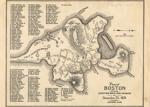
Richard Fairbanks’ tavern in Boston is widely considered the first post office in America, chosen in line with the English tradition of having mail drop-off locations at cafes and taverns. Fairbanks was also a well-known citizen and close friend of the Rev. John Cotton, who established the first church in Boston. At the time the tavern began collecting mail in 1639, letters were primarily used for communication between the Colonies and England and cost a penny each to send.
1710: The Queen Anne Act is passed

The Queen Anne Act, officially referred to as the British Post Office Act, was passed in 1710, but did not have an impact on the American postal system until 1711, when it instituted the Colonies’ first deputy postmaster general. The act also established uniform postage rates for various types of mail sent between America and Europe, one of many means by which the British government taxed the colonists.
1765: The Stamp Act is passed
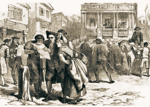
Passed by King George III, the Stamp Act of 1765 required most documents and paper goods in the colonies, including mail, to be marked with a stamp. This stamp showed that a direct tax had been paid for the goods, which had to be provided in English coin instead of Colonial currency. The profits from this legislation returned to the British government in order to help pay for British troops who had occupied the Colonies during the Seven Years’ War.
1775: William Goddard’s postal tenets are adopted by the Second Continental Congress
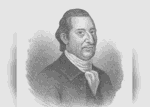
William Goddard was a printmaker in Rhode Island and was one of the most influential individuals in ideating the Constitutional Post in America. Goddard wrote to the Second Continental Congress, petitioning them to create a mail system free from the prying eyes of the government—the opposite of the British Royal Post. Though Goddard was proud to have his ideas adopted, the Congress bypassed him for the role of postmaster general, awarding it instead to Benjamin Franklin and making Goddard the surveyor of the post.
1780s & 1790s: More legislation is passed defining the U.S. Post Office Department
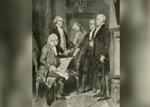
Effective in 1781, Article IX of the Articles of Confederation authorized the fledgling American government to build a postal system; however, the document provided no details about how to go about such a massive undertaking. The U.S. Constitution, ratified just a few years later in 1788, also mentions a national postal system run by the federal government, but is equally vague. It wasn’t until 1792 that President George Washington passed the Postal Act, which established the U.S. Post Office Department, a federal agency led by a postmaster general who sat on the president’s Cabinet.
You may also like: U.S. Army history from the year you were born
1802: A federal law is passed banning Black people from carrying mail for the Post Office Department
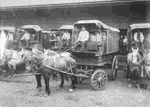
What is known today as the Haitian Revolution was a series of ultimately successful uprisings of enslaved Haitians against British and French colonizers from 1791-1804. The success of these uprisings stoked fear in the hearts of pro-slavery Americans who worried that enslaved people in the U.S. would also create a resistance movement. Though Black people had carried local and personal mail in the Colonies for decades, Postmaster General Gideon Granger was so concerned about a possible “general and united operation” that he convinced Congress to ban Black people from carrying the mail entirely.
1835: The American Anti-Slavery Society uses a technicality to send pro-abolition materials as newspapers via the Post Office Department
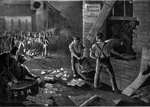
In 1835, slavery was alive and well in the U.S., but an abolitionist movement was growing, especially in the North. In order to distribute pro-abolition materials to the South, the American Anti-Slavery Society decided to distribute a newspaper instead of letters, as the Post Office allowed newspapers to be mailed at lower rates to maintain the freedom of the press. Unsolicited newspapers began showing up at the doors of Southern homes, causing a 3,000-person riot in Charleston, South Carolina, and ultimately pushing the postmaster general to declare that local postmasters could decide whether or not to censor certain newspaper material in order to avoid future violence.
1860-1861: The Pony Express is in operation
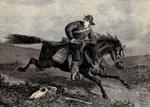
Though the Pony Express occupies an almost mythical position in American consciousness, the operation only lasted about 18 months and was a private endeavor. William Russell, William Waddell, and Alexander Majors began the Pony Express under the name of the Central Overland California & Pikes Peak Express Company in 1860 in order to demonstrate that mail could be delivered from St. Joseph, Missouri, to Sacramento, California, via a central overland route in less than 10 days. The enterprise was initially successful, but due to a number of carrier deaths from the dangerous terrain and the introduction of the telegraph, its assets were sold to Wells Fargo and the Overland Mail Company in 1861 and discontinued altogether shortly thereafter.
1863: The first Black employee of the Post Office Department is hired
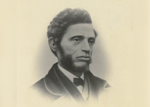
William Cooper Nell was a civil rights activist and historian who began his association with the mail when he was an apprentice at The Liberator, a pro-abolition newspaper in Boston. From there, Nell proceeded to work with Frederick Douglass on The North Star and advocated for the equal education of Black Americans throughout his life. He was not only the first Black employee of the Post Office Department, but also the first known Black employee of any U.S. federal government entity.
1873: Censorship legislation commonly known as the Comstock Act is passed
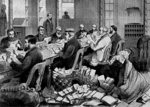
The Act for the Suppression of Trade In, and Circulation of, Obscene Literature and Articles of Immoral Use, also known as the Comstock Act, made it explicitly illegal to send any material through the mail that was deemed “obscene, lewd, or lascivious,” “immoral,” or “indecent.” Anthony Comstock, the legislation’s namesake, was the founder and head of the New York Society for the Suppression of Vice and named a special agent of the Post Office Department in order to enforce this law. Items that were seized under this legislation included documents about contraception and abortion, information from physicians about sexually transmitted infections, and anatomical illustrations, among others.
You may also like: U.S. Marine Corps history from the year you were born
1918: The Post Office Department begins airmail efforts

With the development of aviation technology during World War I and an ever-growing need to move the mail faster, the Post Office Department turned to planes for assistance. Its first flights launched on May 15, 1918, between Washington D.C., Philadelphia, and New York. The service was sold to private contractors in 1927 and provided the financial basis for today’s commercial passenger flight industry.
1960s: Mail backups are rampant across the U.S., causing the implementation of zip codes

By 1960, the Post Office was processing 63.7 billion pieces of mail annually, more than double what it had been in 1940. This huge influx of mail caused massive backups, especially in cities like Chicago, because it was being sorted by hand; however, the efficient mechanization of mail sorting needed addresses to be more specific and standardized. The ZIP code was created in 1963 to do just that, though it faced significant pushback from American citizens who were afraid their small town names would be reduced to just a number.
1970: Post Office Department employees go on strike, resulting in the first postal unions and the reform of the Post Office Department into the U.S. Postal Service
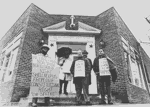
The 1970 postal strike was led by the newly established National Association of Letter Carriers and included nearly 200,000 postal workers. The mail slowed so much during the strike that the National Guard was brought in to sort and carry the mail. Ultimately, the NALC was able to negotiate a union contract, and Congress passed the Postal Reorganization Act, creating the United States Postal Service as a quasi-governmental organization that finances itself independently.
2006: The Postal Accountability and Enhancement Act is passed

The Postal Accountability and Enhancement Act overhauled many aspects of how the USPS operates financially. It requires the USPS to pay retirement benefits for employees 75 years in advance and maintains postal employees on an independent medical coverage system that is not integrated with Medicare like other government entities. The PAEA also has provisions that limit the Postal Service’s ability to raise prices on postal goods and expand into new revenue streams without congressional approval.
2020: The U.S. Postal Service experiences extreme mail slowdowns due to the COVID-19 pandemic

Due to the COVID-19 pandemic, Americans relied more and more on the work of the USPS, ordering more packages online, getting groceries delivered, and even receiving medications via mail. This influx in volume, along with infrastructure issues and staffing difficulties, spiraled into ongoing mail delays. These issues impacted the process of the 2020 Presidential election, as many voters—an estimated 46% of all votes cast—chose to vote by mail in order to avoid going to polling places in person and risking COVID-19 exposure or infection.
You can reach Jesse Duarte at 707-967-6803 or jduarte@sthelenastar.com.
Source link

